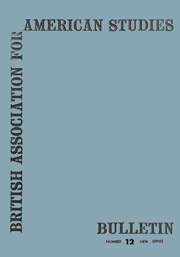No CrossRef data available.
Article contents
James Branch Cabell: a Reappraisal
Published online by Cambridge University Press: 17 February 2011
Extract
Even today it is still possible, by the help of some such accident as censorship, for a good book actually to become widely read. This is, of course, precisely what happened to Jurgen in 1920. Yet it is tempting to believe that Jurgen was released primarily because, as Judge Charles C. Nott observed when recommending the jury to acquit the defendants, very few readers would be capable of understanding it. There seems little doubt that Cabell was suppressed for what he didn't say and exalted for what he didn't mean. This may be an inevitable penalty for creating what is, in effect, a spiritual synthesis in an age of intellectual analysis. But the wheel must turn, and with Edward Wagenknecht's fuller comprehension in his Cavalcade of the American Novel (1952) and Edmund Wilson's article in the New Yorker in April, 1956, perhaps we are now ready to honour Vernon Louis Parrington's description (in The Pacific Review of 1921) of Cabell as:
- Type
- Research Article
- Information
- Bulletin of the British Association for American Studies , Volume 7 , Issue 1 , August 1958 , pp. 37 - 45
- Copyright
- Copyright © British Association for American Studies 1958


